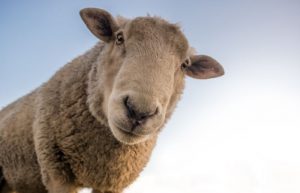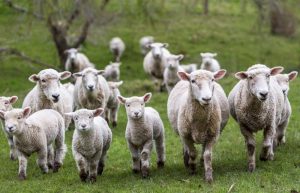
How Do Sheep Show Affection?
While some people may only think of their sheep as livestock, others think of them as their pets. If that’s the case for you, it can be helpful to know what your sheep is feeling when you’re around. Are they scared of you? Or do they like being in your presence? In this article, I’ll cover how sheep show affection.
So, how do sheep show affection? There are numerous way sheep will communicate to you that they like you. Here are a few ways sheep show affection:
- they will be willing and confident to approach you
- an affectionate sheep will rub against you
- they will follow you
- they will look relaxed around you
- the sheep will want to play with you
If you’re new to owning sheep, it can be difficult to recognize what your animals are trying to communicate to you. The more you learn about your sheep, how they communicate, and their natural instincts, it will become easier to understand what they are trying to “say.” Keep reading to learn more about how sheep may show affection!
An Affectionate Sheep Will be Confident in Approaching You
By nature, sheep are known to be skittish and uncertain. This is largely due to the fact that they are prey animals. As prey animals, their natural instinct is to run away from anything that may be a potential danger. Running away is the greatest defense they have from predators.
That being said, an affectionate sheep willing and confident to approach you. This shows that they don’t see you as a threat, but rather as a friend. Even if a sheep will come to your vicinity and just hang out or graze while you do something else, this can be a good sign that the sheep likes your presence.
Can sheep protect themselves in any way besides running off? To know more, check out my article How Do Sheep Protect Themselves? Essential Guide.
An Affectionate Sheep Will Rub Against You
If a sheep is really trusting, they’ll even go so far as to ask for attention by rubbing against you when you go into their pen. I’ve seen sheep run over to their handlers and rub against their legs, asking to be pet. Sheep are social creatures live in flocks with many other sheep; one of the biggest way social creatures show affection is through touch.
If a sheep is willing to come up to you and let you touch them, chances are they see you as one of their own. Sheep imprint on their species and on their mothers when they are young, but if a lamb imprints on a human through bottle-feeding, they will think of the human as their mother. This means that the human will be the thing that the sheep trusts the most.
An Affectionate Sheep Will Follow You
As prey animals, one defense mechanism sheep used against predators is living in a flock. Predators are less likely to attack a larger group of animals; instead, they usually go after stragglers who wonder away from the group. For this reason, sheep have an instinctual desire to stay close to other sheep or animals they deem friendly. This means if one sheep or animal move, they all follow in order to stay close together.
Some livestock animals have to be driven forward, like cattle. If you watch a cattle drive, the wranglers drive the cows forward from behind the herd. With sheep on the other hand, sheep will willingly follow someone or something they trust. This makes it relatively easy to move a sheep flock from place to place. So, if a sheep is follows you, it’s a good sign they think highly of you!
An Affectionate Sheep Will Look Relaxed Around You
Just like humans, one of the best places to look to see what your sheep are feeling is their face. Sheep can be very telling with their facial expressions, and an animal’s facial expressions tend to mimic those of humans, so it’s easy to understand what they’re feeling. For example, a nervous human will often have a worried look on their face just like a nervous sheep would too, wide eyes and all!
So if your sheep have a relaxed look and a calm demeanor around you, this communicates that they are comfortable around you. A sheep that is comfortable around you may also tend to be even more expressive, since they feel like they can communicate with you.
An Affectionate Sheep Will Want to Play With You
 If you’ve ever watched lambs and sheep play together, it’s pretty cute. They’ll run around and circles and jump and hop all over the place. Sheep will only play with animals they are comfortable playing with, as playing can quickly become chasing and hunting depending on the animal.
If you’ve ever watched lambs and sheep play together, it’s pretty cute. They’ll run around and circles and jump and hop all over the place. Sheep will only play with animals they are comfortable playing with, as playing can quickly become chasing and hunting depending on the animal.
If you enter your sheep pen and a sheep starts running around you and hopping, this is a sign that the sheep wants to play with you. You can actually play with your sheep by running away and letting them chase you or by you chasing them a little ways and letting them come back. A hyper playful sheep will love this!
How to Get a Sheep to Like You
Sheep that haven’t spent much time around humans make be apprehensive of your presence. There are some things you can do to help your sheep become more familiar with you and start to see you as a friend. Try these tips!
Introduce Young Lambs to Human Interaction
As soon as you can, introduce lambs to human interaction. If a lamb can develop a connection with humans early, they’ll trust them their whole lives due to imprinting. Imprinting is when young lambs form a deep trust in their mother, or the human taking care of them. Imprinting comes through spending a lot of time with a new lamb and trying to be there when they are born.
Most lambs that have to be bottle-fed and hand-raised end up imprinting on humans, but even by spending time with lambs in their pen with their mothers can help them start to develop a connection with humans.
Spend Time With Your Sheep
Not everyone will raise sheep from lambs. Maybe you’ve gotten mature sheep who were apprehensive to begin with. If this is the case, the sheep just have to learn that you are someone they can trust. Just like with any relationship, the best way to develop trust and let your sheep get to know you is by spending time with them.
This may look like just sitting in your sheep’s pen while they graze or rest or even working outside the pen close-by on some other project. As your sheep get comfortable, it can become where you spend time petting and scratching them. If you’re willing to put in the time, just about any animal can learn to trust.
Feed Your Sheep Treats
Animals love food. It’s a great way to motivate your animals and teach them to positively associate with you. All that said, feeding your sheep their meals and giving them treats can be a great way to help your sheep see you in a positive light.
It can get to where as soon as your sheep see you, they start bleating for you to come and give them treats. Giving them treats can help them feel confident in approaching you. You can try giving them treats like apples, pumpkin, oats, lettuce, and carrots. Give your sheep leftovers or fruit or vegetables that haven’t been eaten to save anything from going to waste!
Develop a Routine With Your Sheep
Most animals learn by repetition. That means they do something, the more they start to understand the concept. One of the best ways to help your sheep get used to you being around and learning to trust you is to develop a routine. In this routine, you should be seeing your sheep around the same time each day, and you can plan for multiple times a day.
Routine also helps animals feel safe, as it provides them something to be familiar with as they can anticipate what is going to happen next. By doing this, your sheep will start to anticipate seeing you at the set time throughout the day. They’ll also get to see you frequently without being overwhelmed by too much of you at one time.
Being able to understand your sheep’s behavior is just one way you can take care of them. Like with any animal, there are specific things to know when it comes to caring for your flock of sheep. To get a complete overview of how to care for sheep, check out my article How to Care For Sheep: Essential Guide For Beginners.
